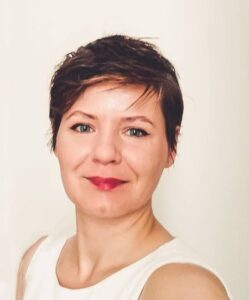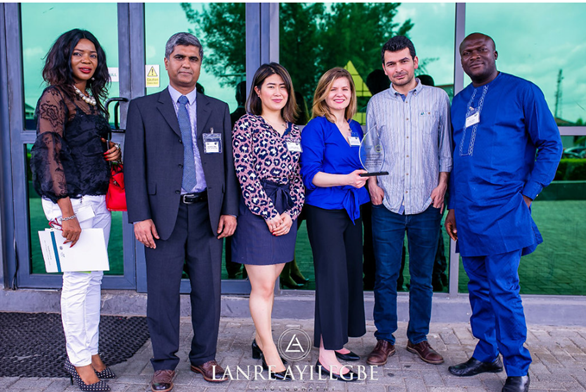FLEXIS Project Development Officer, Karolina Rucinska: Projects, Green Impact Bronze Award and lab happiness
FLEXIS Project Development Officer, Karolina Rucinska, delivers another successful project and helps secure the Green Impact Bronze Award for Cardiff University’s Queen Building!
Partnering her passion for sustainability, people and partnership working, Karolina was a key player in securing the Green Impact Bronze Award for the Queen’s Building and the ‘home’ for a large part of the FLEXIS team.
We catch up with the project powerhouse and find out more about her role at FLEXIS and her passion for science, technology and society studies and her research into “lab happiness”

FLEXIS project development officer, Karolina Rucinska
What is your role at Cardiff University and within FLEXIS?
I’m a project development officer for FLEXIS’ integrated energy supply work package. This project looks at how we can integrate more flexible energy systems and low carbon alternatives such as hydrogen into the gird so that is can be used by businesses and in people’s homes.
I devote half of my time to research development and the other half towards the management of the multiple projects won under the FLEXIS programme. These projects include thing such as software to improve real-time operation of public sector multi-energy systems and looking at heat demand – as part of National Grid’s Zero2050 initaitvie. In practice, I look after staff, students, budgets, events, training, dissemination and more.
What do you enjoy most about your role?
Every day is different. I am never bored. There are always new challenges, new proposals to work on, new training needs, new colleagues to engage with, new purchases, new budgets to look after and ideas to develop. I like organising while juggling and developing new projects, so this role suits me a lot!
I love acquiring new knowledge, so being surrounded by a diverse group of people makes my job very stimulating. I have been blessed with my line manager, Professor Nick Jenkins. He is happy for me to experiment with new ideas and improve how research projects are run. He always holds me accountable, which I like because that shows he cares a lot about my progress and development. This is yet another reason why I enjoy my role – having a dream line manager.
What has been your proudest moment at FLEXIS?
I think getting us safely to Nigeria and Brazil for two great workshops on the topic of … renewable energy, of course! That was a great moment for me. We had a great time, met amazing people, got inspired by the needs of communities and learned a lot. We came back with an award and some great memories. I made some solid friendships with my coworkers and international researchers.

Colleagues from FLEXIS and the Federal University of Petroleum Resources, FUPRE. Photo credit Lenre Ayilegbe
I was also super proud when I won three proposals to organise training for staff and students. One of the proposals was developed with Cynnal Cymru, a local non government organisation in Cardiff, who are certified to run Carbon Literacy Training. I wanted research engineers to start thinking outside the box when it comes to sustainable engineering. Specifically, I wanted researchers to consider their role in climate change so that, when writing proposals, they can empathise with the public. In my experience, researchers in engineering talk about the public, forgetting, like everyone else, they also use energy, produce waste, drive cars and fly for conferences. We all have a responsibility and can make a difference.
The feedback from the training was positive, and my colleague Jamie Lewis repeated the training with an additional 12 colleagues from FLEXIS. A further three member of the team are now looking to become Carbon Literacy trainers themselves. I believe the training which I developed with Cynnal Cymru is now being certified.

Dr Renato Zagorscak and Seif-Eddine Zitouni with their Carbon Literate Certification
Another reason why I am so proud of this is that the training attracted researchers from across the School of Engineering. Everyone was talking, collaborating and discussing ideas which are normally left to sociologists. The result was colleagues got certified and came up with solutions to ‘green up’ their research activities. The trainer, Rhodri Thomas, who is a consultant from Cynnal Cymru, enjoyed the experience of running a week-long remote session with us. So much so that he wrote about it here!
How did you get into the engineering sector?
Great question! I think to finally learn what the 1st law of thermodynamics, inverters, converters and power electronics are! Not kidding!
I majored in humanities; I have an MSc in Sustainability, Planning and Environmental Policy and I’m working on a PhD thesis in the field on Science, Technology and Society Studies. I’ve done a lot of research projects on public perception of science. I felt that I could talk about science and engineering, but not fully understand how it works in partnership. I was quite opinionated as to what should be done to create a sustainable future while knowing very little about the basics but complex concepts such as energy, heat and electricity.
In 2016, a job came up at the School of Engineering to look after a European grant about voltage converters for offshore wind. At that time, I was a part-time and self-funded PhD student working on controversies in science. I loved managing research projects and I was writing a paper about energy transitions post COP21. I applied. A friend of mine, who is now a senior research analyst at WRAP, helped me to prepare for an interview. I am quite nervous during interviews, and she helped me to show my best side.
I got the job and I soon fell in love with the School of Engineering. Every day at work was like watching science, or rather, engineering in action (a term coined by Bruno Latour, philosopher of science). I am still here 😊
I will never be able to write equations, do modelling of energy systems or design new topologies for power electronic devices, but, I am pretty good at translating engineering research into human language and explaining how things work, what my colleagues are actually doing on their laptops, and why their research matters. So in a way, I am still doing what I have been trained to do: understand others and build connections.
I think I could do that in every sector, but for now, I like it here. After all, energy is at the heart of sustainable developments. See for example, a paper by Nerini et al. so for me, it is the best place to be.
What are you working on at the moment?
I am working on a “lab happiness” programme with Dr Sophie Morris. I was inspired by an article in Nature to continue doing what I have been doing for the last few years behind the scenes: helping researchers gain more confidence, more awareness of how their research fits into the “real” world, more team playing mentality, more resilience and more satisfaction. A happy researcher makes good progress, makes good science, and ultimately delivers projects that have an impact.
Where do you see yourself in 5 years’ time?
I would like to be a programme manager and hopefully research director, working on real solutions for the real world with a team full of people with heads in the sky and feet firmly on the ground.


